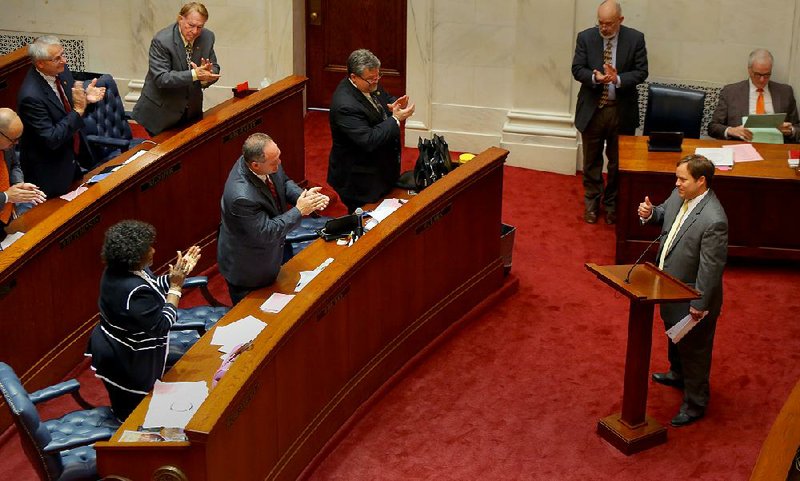Some professional photographers in Arkansas are seeking clarity on how to comply with a new publicity protection law named for Frank Broyles, the former University of Arkansas head football coach and athletic director.
The law was passed by the Legislature earlier this year.
The Frank Broyles Publicity Rights Protection Act of 2016 requires individuals to give permission for certain uses of their photograph, name, image or other likeness in order to be used for commercial purposes. The bill's author, Sen. Jon Woods, R-Springdale, said relatives of Broyles approached him because they were worried that people were damaging the coach's reputation by using Broyles' name and image to sell products without permission.
Photography groups, along with film and Internet companies, gave support to the bill after changes were made to a similar version vetoed by Gov. Asa Hutchinson in 2015. Now some photographers in the state have questions about whether their use of certain images requires permission under the act, two members of the Arkansas Professional Photographers Association say.
State Rep. Bruce Cozart, R-Hot Springs, submitted a request to Attorney General Leslie Rutledge in June to review whether a generic release form submitted by the Arkansas' photographers group fulfilled the requirements for permission under the law.
In an opinion released Thursday, Rutledge declined to say whether the form met the law's standards. The opinion states that the law doesn't describe what the contents of a licensing agreement should include.
Joel Schmidt, a former president of the Arkansas Professional Photographers Association, said that after the Broyles law passed, the group had worked with the Atlanta-based Professional Photographers of America to find a release form that could be used by photographers to abide by the law's standards.
Cozart's request was filed on behalf of Gary Meek, an independent Hot Springs photographer. His wife, Kathryn Meek, is the executive secretary of the board for the Arkansas photographers group.
Kathryn Meek said Friday that the group had not yet decided how it would go about seeking an opinion on the release forms after the attorney general's decision, though she said they may hire private legal counsel to review them.
She said the law wasn't affecting their businesses, but "it's just some of our photographers were concerned about the legal ramifications down the road."
Both Meek and Schmidt said photographers' primary questions involve publishing images of well-known people taken at large gatherings such as weddings that they are hired to shoot.
If everyone at the event does not sign a release, Meek said, some photographers have concerns that they could be sued by people in the photographs.
After an earlier version of the law was vetoed by Hutchinson in 2015, Woods revised the proposal, adding exceptions for artists and photographers. The photographers association was more supportive of the revised bill, Schmidt and Meek said.
One of those exceptions includes photographs where individuals appear "as a member of the public, an attendee of a photographed event, or in a public place, and the individual is not named."
At the Arkansas Professional Photographers conference last month, Schmidt said the law had not been a topic of conversation.
"Not once did I hear anyone bring up that this legislation has caused them any difficulty in their normal operation, so so far, so good," Schmidt said.
John Tull, a lawyer for the Arkansas Press Association, said he had not heard of complaints from photographers or groups since the law was passed this year.
The revised version of the bill, with its exemptions for photographers, was opposed by professional athlete organizations, which argued that the law prevented players from protecting their likeness while holding events in the state.
Metro on 08/06/2016
